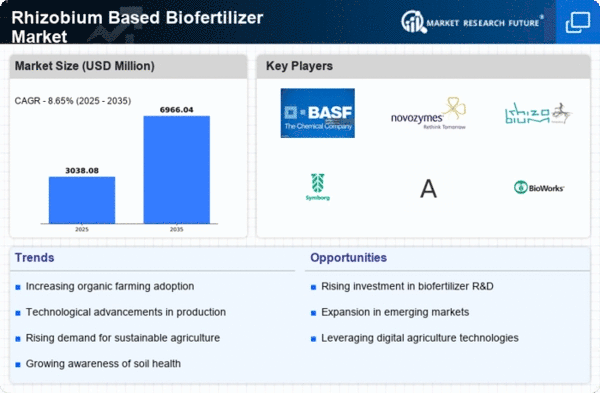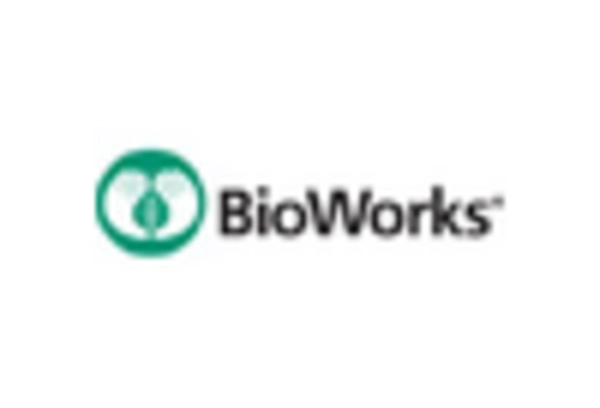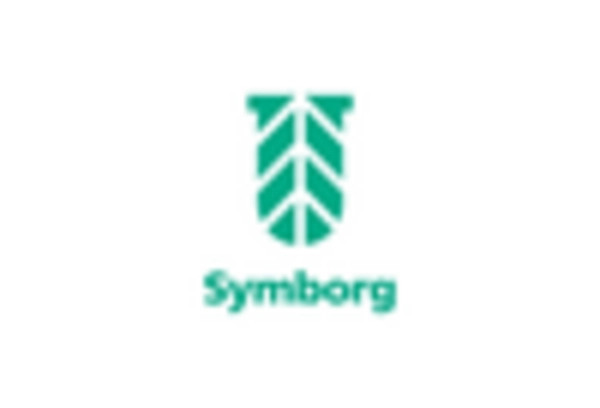Market Growth Projections
The Global Rhizobium-Based Biofertilizer Market Industry is poised for substantial growth, with projections indicating a market value of 2.8 USD Billion in 2024 and an anticipated increase to 6.97 USD Billion by 2035. This growth trajectory reflects a compound annual growth rate (CAGR) of 8.64% from 2025 to 2035. Such projections highlight the increasing recognition of the benefits of biofertilizers in sustainable agriculture. As more farmers and agricultural stakeholders embrace these products, the market is likely to expand, driven by a combination of environmental awareness, government support, and technological advancements.
Rising Awareness of Soil Health
There is a growing awareness among farmers and agricultural professionals regarding the importance of soil health, which significantly impacts the Global Rhizobium-Based Biofertilizer Market Industry. Healthy soil is essential for sustainable crop production, and rhizobium-based biofertilizers contribute to improving soil fertility and structure. This awareness is leading to increased adoption of biofertilizers, as they provide a natural means of enhancing nutrient availability for crops. The trend is particularly evident in regions where soil degradation has become a pressing issue, prompting farmers to seek effective solutions. As this awareness continues to spread, it is likely to further drive market growth.
Government Initiatives and Support
Government initiatives play a crucial role in promoting the Global Rhizobium-Based Biofertilizer Market Industry. Various countries are implementing policies that encourage the use of biofertilizers as part of their agricultural strategies. For instance, subsidies and grants for biofertilizer production and application are becoming more common, which incentivizes farmers to adopt these sustainable practices. Additionally, educational programs aimed at informing farmers about the benefits of rhizobium-based products are gaining traction. Such support not only enhances market growth but also aligns with global sustainability goals, fostering an environment conducive to the expansion of the biofertilizer sector.
Global Population Growth and Food Security
The Global Rhizobium-Based Biofertilizer Market Industry is also being driven by the challenges posed by global population growth and the corresponding need for food security. As the world population continues to rise, the demand for food is expected to increase significantly. This situation necessitates the adoption of sustainable agricultural practices, including the use of biofertilizers, to enhance crop yields without compromising environmental integrity. The market is projected to grow as farmers seek effective solutions to meet the food demands of an expanding population. This trend underscores the critical role that rhizobium-based biofertilizers will play in future agricultural practices.
Increasing Demand for Sustainable Agriculture
The Global Rhizobium-Based Biofertilizer Market Industry is experiencing a notable surge in demand driven by the increasing emphasis on sustainable agricultural practices. Farmers are increasingly seeking eco-friendly alternatives to chemical fertilizers due to growing environmental concerns and regulatory pressures. This shift is reflected in the projected market value of 2.8 USD Billion in 2024, with expectations to reach 6.97 USD Billion by 2035. The compound annual growth rate (CAGR) of 8.64% from 2025 to 2035 suggests a robust growth trajectory as more agricultural stakeholders recognize the benefits of using biofertilizers to enhance soil health and crop productivity.
Technological Advancements in Biofertilizer Production
Technological advancements are significantly influencing the Global Rhizobium-Based Biofertilizer Market Industry. Innovations in production techniques and formulations are enhancing the efficacy and application of biofertilizers. For example, the development of new strains of rhizobia that are more effective in nitrogen fixation is becoming increasingly common. Additionally, advancements in delivery methods, such as encapsulation technologies, are improving the stability and shelf life of biofertilizers. These innovations not only make biofertilizers more appealing to farmers but also contribute to the overall growth of the market, as they address previous limitations associated with biofertilizer use.
















